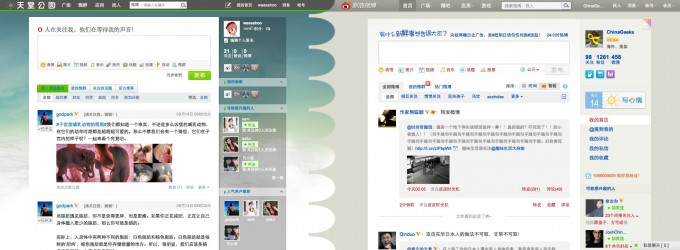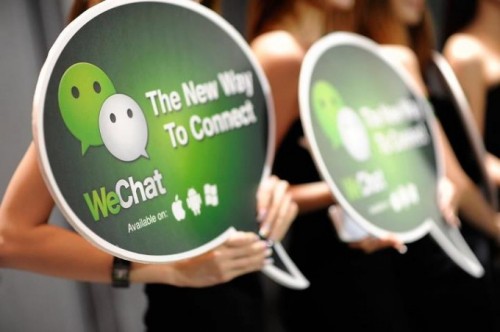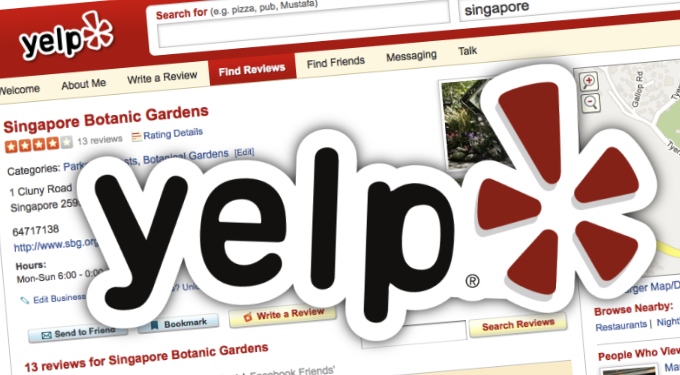We Are Social Asia Tuesday TuneUp #46
Buy your own Weibo clone
Tech In Asia recently reported chancing upon a Weibo clone, named JiShiGou, intended for sale to corporations seeking to incorporate microblogging technology into their operational workflow. Hosted on the corporation’s servers, the product offers integration with Tencent and Sina Weibo, in addition to other Chinese social networks. What’s the price tag? The basic web package starts at 10,000 RMB (S$1,932) with optional add-ons such as text messaging support as well as iPhone/iPad and Android phone and tablet apps available at an additional fee. It costs US$2,380 (S$2,910) for iOS apps and US$ 1,587 (S$1,940) for Android apps with text message packages at US$126 (S$154) per 10,000 texts. JiShiGou makes it easy for a corporation to own a whole microblogging system complete with apps, text messaging support, auto-backup, updates and training for less than US$10,000 (S$12,225).
Tencent to localise WeChat in Indonesia
WeChat (aka “Weixin” in China) recently zipped past the 200 million users mark. Encouraged by the growth, Tencent, the company behind this messaging app, is setting its sights further afield for worldwide growth. Viewing Indonesia as a huge potential userbase because it comprises half of the Southeast Asian population, Tencent plans to set up an office in the country soon and has been in talks with local celebrities, media and merchants on co-marketing partnerships. In addition to considering making its app available on Blackberry, Tencent is exploring working with some telcos for BBM packages for WeChat.
Tencent releases version 1.2 of Weiyun cloud service
Version 1.2 of Weiyun, Tencent’s personal cloud storage offering, links up with the company’s Weibo microblogging and Weixin messaging service and runs on iPhone, Android and Windows. Comprising “wangpan” (cloud storage), a photo album that synchronizes across multiple devices, Wi-Fi hotspot transfer feature and a cross-device clipboard feature, Weiyun allows seamless sharing of files, text, and photo independent of the internet. Though currently still only available in Chinese, Tencent is open to exploring multi-language options to support global expansion.
China’s Renren network mimics Facebook’s Timeline
Renren, a Chinese social network that has always maintained a close look and feel to Facebook , has now introduced a profile structure similar to Facebook’s Timeline. Facebook is currently blocked in China, but Renren continues to grow, though its engagement numbers are not as strong as Facebook’s. Renren reported 45 million monthly active users in Q2, which is only 27% of its 162 million total active users. Renren also created a Pinterest clone earlier this year.
Microblogs get their own Chinese TV drama
Microblogs, known as Weibo in China, are such a pervasive cultural phenomenon, they’re the focal point of a new Chinese TV drama called Micro-blog Master. Set in 2010, the period of the rise of microblogs in China, the fictional story documents the competition between two rival weibo companies. Those who are hoping that the drama’s based on Sina Weibo and Tencent Weibo will be disappointed to know that the drama doesn’t tell their story.
Yelp debuts in Asia with Singapore launch
US-based reviews and listings site Yelp recently launched in Singapore, marking its foray into Asian markets, albeit pretty late in the game. Wired Singaporeans can submit reviews on places whilst businesses can start up their own pages on the site. Food review sites are not new in Singapore as locals have already been using popular sites like Hungrygowhere or apps like Burpple. In other parts of Asia, Yelp faces competition from locally developed services such as Zodio in Thailand, which is looking to expand within the region and Dianping, which has established a firm foothold within China.
19% of US online women on Pinterest, 12% of US online adults Instagram
A new study from the Pew Internet Project found that almost half of all online adults have posted original photos online. For the first time, Pew asked respondents about their use of photo-heavy social networks, specifically Pinterest, Instagram and Tumblr, and found that 12% of online adults use Pinterest, but a whopping 19% of American online women are on the site, mostly creating home decor wishlists and looking for craft inspiration. About 5% of US online adults are on Tumblr, with 11% of young adults on the site. Instagram’s growth has also skyrocketed in the months since its acquisition by Facebook. 12% of US online adults are using Instagram, including 27% of 18 to 29 year olds. In the last six months, the daily active user base has had grown by more than 1,000%, with its daily active user base now standing at 11 million strong. Maybe $1 billion was more of a bargain than we originally thought?
Fortune 500 companies embrace corporate blogs
America’s largest corporations haven’t always embraced the idea of having unfiltered online conversations with the public, but new research shows that the times are a’changing. Adoption of new social platforms, especially corporate blogs, has increased across Fortune 500 companies over the last year, even after so many have proclaimed the death of the blog. This year saw the largest increase in corporate blogs among these companies since 2008.

European business execs turn to Twitter before big-name publications
The upper echelon of the business world now spends more time on Twitter than on well-known business websites, like Reuters, Bloomberg and The Economist, according to new research. The research tries to pinpoint the media habits of executives with an average salary of £125,000. More than 60% of the execs said they accessed content via their mobiles, and LinkedIn is surprisingly the most popular website for this group.
Ping hears its death knell, but iTunes and iPhone still get social
Ping, Apple’s ill-fated music network, will soon be going to the internet graveyard, and Apple finally set the date on Ping’s iTunes page: September 30. The network’s shutdown was imminent, as Apple announced a new version of iTunes with more integration with the already established social networks, Facebook and Twitter. Users can now ‘Like’ music, videos and apps and see what friends like. And it’s not just iTunes that’s getting friendly with social networks, it’s also the new iPhone and iOS 6. New features include updating Facebook or Twitter using Siri, sharing photos, links and map locations to Facebook and syncing your phone book contacts with your Facebook friends.

Facebook ends Reach Generator program in favour of Promoted Posts
Facebook has ended its Reach Generator program for premium advertisers, less than seven months after it was announced. Reach Generator allowed advertisers to pay Facebook on an ongoing basis to sponsor their page posts and guarantee a 75% reach of the page’s fans over a month-long period. Facebook are focusing instead on their Promoted Posts to simplify their ad offering. This product is available to all pages with more than 400 likes. Promoted Posts, like Reach Generator, ask advertisers to pay a fee to reach a portion of their existing audience.
New Open Graph policy will help Facebook understand affinity
Developers who create custom Open Graph actions that express affinity — for example “love”, “favourite” or “star” — will now need to associate their verbs with the social network’s built-in Like action. This will help Facebook understand the nature of the connections users are making so that they are able to detect positive affinity better for advertisers. Facebook started allowing developers to create custom verbs for their apps last year, and the most popular ones express something simliar to a ‘Like’, such as “smileyface”, “yum” and “nom”. But not all of these verbs have to be positive, so Facebook has asked developers clarify them so that ads can be targeted to someone who makes an action equivalent to a “Like”.
Has Facebook eliminated a few degrees of separation?
Just how connected are the people across the planet? Facebook has by far the most complete data set and research behind real-world friendships, and through a partnership with Stamen, a design studio, we can see just how intertwined the world is. The project poses some awesome Freakonomics-style questions: Why do so many Japanese people live in Brazil? How did so many people from Australia and Nepal become good friends? Set aside a good chunk of time for this one.

Twitter beefs up targeting options for Promoted Tweets and Accounts
Twitter has added even more specific geo-targeting options for its paid-for features, such as Promoted Tweets and Accounts, and some countries can now be targeted based on their region or city. Twitter has put the focus on three countries, including Japan, which now has options for wider regions around Tokyo, Osaka and Nagoya. This is also true in the UK, where tweets can now be targeted to London or Manchester. But the most interesting might be the update for the US, not long before election time in November, where advertisers can now set geo-targets based on state.
Twitter agrees to surrender tweets of Occupy protester
Twitter has ended its legal battle with New York prosecutors and agreed to hand over the tweets of Occupy protester Malcolm Harris, which may show that the defendant knew he was breaking police orders. The social network had initially argued that the tweets were Harris’s property and, as such, handing them over would serve as a breach of the Fourth Amendment. The case represents an interesting landmark in the nature of privacy and proprietary rights over content posted online.
LinkedIn hits 10 million users in the UK
LinkedIn, the social network for jobs, has announced that 10 million British professionals use the site. LinkedIn dug through its data and highlighted the top job titles (“owner” easily takes the top slot), the biggest industries and the most represented companies on LinkedIn in the UK. And today we learned that there are exactly 103 British people who call themselves professional sailors on the site.
Google buys Instagram competitor Snapseed
Did Facebook’s acquisition of Instagram leave Google shaking in its boots? Google’s first round of retaliation has now come, as it picked up mobile app developer Nik Software, meaning that Google now owns Snapseed, an Instagram competitor. Although Google+ often gets dismissed as a ghost town, the network could become a go-to platform for photographers, which have already been flocking to the site because it has been quick to adopt photo-friendly features, such as showing photos in a large format and in a lightbox, which Facebook quickly noticed and implemented as well.
New Skype beta lets users sign in using Facebook
Skype has been integrated with Facebook chat for a year now, but Skype has just added a feature to its beta version for Windows and Mac that make signing up to the app even easier: Just log in to Skype using Facebook. Skype is also touting more of its Microsoft credentials, and the beta also comes with Live Messenger integration.
Saturday Night Live asks the crowd for recommendations
The fans spoke, and Saturday Night Live listened. The popular US show is now asking its fans for suggestions about hosts and performers after noticing that fans took to its Facebook page to make recommendations. Now Saturday Night Live has made it official. Tweet using the hashtags #SNLHost or #SNLMusic or leave your comment on their once-a-month crowdsourcing posts, and sit back and enjoy your selection.
Oreo dives into pop culture with ‘Daily Twist’ campaign
Who knew Oreos were so versatile? From the now-iconic image of the 7-layer rainbow Oreo celebrating Gay Pride Month to the release of the new iOreo 5, Oreo has been celebrating its 100th birthday year by posting historic milestones on Facebook and making itself part of history in the process. Through timely and tongue-in-cheek updates, the page has seen a 110% growth in engagement. If the gay pride Oreo started the conversation, its latest post mocking the iPhone 5 has kept the viral ball rolling.

Grey Poupon seeks out only the classiest of Facebook
Need an excuse to remove a few Facebook friends or clean out your ‘Likes’ section? Grey Poupon is putting potential fans to the test by asking them to first apply for membership to the Society of Good Taste before they are allowed to ‘Like’ the page. If you’re rejected, try, try again. Though we’re sure to be let in, as we do know a few things about the best-of-the-best secret societies…

The xx release new album through a single fan
Alt-pop band The xx have taken the socially driven album release further than ever before. Unlike other bands, which usually tie social releases with a large initial reveal,‘Coexist’ was sent to just one fan and allowed to spread organically from there, which is visualized on their site. A digital copy of the album is also being given to everyone who purchases a tour ticket, showing the shifting face of interaction between fans and artists.

Artspace.com and Tumblr team up to find ‘the next Artspace Artist’
Artspace.com, the leading online marketplace for contemporary art, has partnered with Tumblr to host a competition to find ‘The Next Artspace Artist’. The winner will receive a cash prize and the opportunity to create an Artspace Edition to be sold alongside famed contemporary artists. Emerging artists may submit work for consideration via a dedicated Tumblr. Semi-finalists will be chosen on by Tumblr popularity (reblogs and other share options) before being whittled down to three finalists by a jury of art experts.
Millions watch online video of Topshop London Fashion Week Show
More than 2 million people from 100 countries watched online footage of Topshop’s Spring/Summer 2012 Unique show in the three hours after the fashion retailer live streamed it. Both #Topshop and #unique trended globally on Twitter, and Topshop estimates that more than 200 million people were exposed to image and content from the show within that time. Viewers saw a personalized live stream, and they could click on clothes and accessories to browse colour options as they came down the catwalk. They could also create screenshots and video clips to share instantly on Facebook, as well as pre-ordering the collection for delivery. Broadcast on Topshop’s website and Twitter page, as well as 200 media partner websites, the show was also shown on large screens at its Oxford Circus flagship store in London.
Volvo looking to make brand relevant for Pinterest users
One challenge for certain brands using Pinterest is getting users to engage with visuals about a product that would not always interest them directly. A shot of a Volvo, for example, might not be particularly engaging for all Pinterest users. So that’s why the car company created a contest where, by creating a board about their ideal road trip and repinning a Volvo S60 image, users can win the trip they’ve dreamt up. Volvo’s social media manager says the campaign is “about situations that pinners can relate to, where the Volvo brand is relevant”.
Kraft Cheese teams up with Five Guys to feed the hungry with Foursquare
To celebrate National Cheeseburger Day, Kraft is teaming up with Five Guys, the popular burger chain, and is using Foursquare to spread the word. Each check-in will trigger a meal donation to Feeding America, and users will get a thank you coupon for Kraft Singles. As an extra bonus to get you to the top of the leaderboard, Foursquare will be offering bonus points for checking into a burger restaurant on September 18.

Bacon Barter campaign asks exactly what bacon is worth
Everyone’s had them — times where you’d do anything for a bacon sandwich. To see just how far bacon can go, Josh Sankey is travelling across America without cash or card, but plenty of bacon. He’s hoping to see how far he can get, trading the meat for other sustenance, car equipment and even places to sleep. The campaign for Oscar Mayer is being promoted on Facebook, Instagram and Twitter via #BaconBarter.



